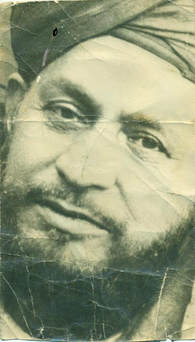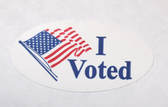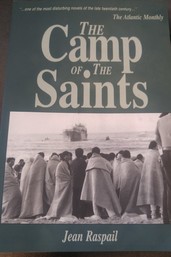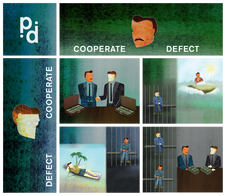 She sat in the courthouse, waiting to pay off a traffic ticket, watching the nervous hustle around her. Courthouses are strange places of emotional extremes: people shifting their weight nervously, crying tears of joy or rage or despair, hugging family members, attorneys. Quick, hushed conversations – supposedly privileged, but had out in the open – that can decide a family's fate for years to come. She felt impatient, but relieved that her task was mundane compared to the cacophony around her. In a few minutes she'd be done and on her merry way. Suddenly, unfamiliar uniformed police officers called her name. “Yes?” she answered nervously. She had a criminal record. A dangerous one: she had stole a purse. But she did her time – suspended time, meaning she didn't actually have to go to jail because the crime, wrong as it was, was minor. Punishment should fit the crime, of course. Justice was served. And besides, she was done, the case was over. She paid her debt to society. Wasn't there something she had heard about double jeopardy? The next several seconds were life-altering. Immigration officers began a process that would result in her incarceration for over a year, losing her green card, and her subsequent deportation to a country that she barely remembered. Shortly thereafter, the law would change and the crime of shoplifting that she paid for – twice – no longer was a basis for her mandatory deportation. But too late for her dreams of nursing school, or even a last Christmas with family. Did the punishment fit the crime? Welcome to the tangled web of crimmigration – the immigration consequences of criminal activity. (Yes, it's a real field of law, one in which I've practiced for over 10 years.) This is what you get when two vastly different bodies of law collide and are then meshed together, as if they were supposed to. Criminal law starts with the presumption of innocence, because we recognize that we don't take away someone's liberty without good reason: beyond a reasonable doubt. Deportation law starts with the presumption of “guilt” - ineligibility to remain in the US, unless there is a form of relief. Criminal law guarantees a lawyer, paid for by the government if necessary, because the stakes are high and the law is complex. There is no public immigration defender, even though frequently, the stakes are even higher. Criminal law grants the right to a speedy trial. No such right exists in immigration court. We have juries in criminal court. We even have juries in civil court, to decide things like breaches of contract. But there are no juries in immigration court. Oil and water. I fought for her. I noted that she was given the wrong advice about the immigration consequences when she pled – the transcripts proved it. Had she gotten the right advice, it would have been possible to reduce her suspended sentence by one day, and she would have been eligible to save her green card. I appealed her case all the way to the state supreme court, but they ruled the error wasn't big enough to warrant a reversal. Our immigration law is plagued with a horrendously bad idea: that people can be illegal and hence disposed of, like so much trash, regardless of their equities. Sure, some people absolutely deserve to be banished from the country. But as crimmigration law evolved, it became more rigid. Judges used to have the power to stop a deportation where such banishment would result in a miscarriage of justice. Since 1990, they no longer have that power. In 1996, President Clinton signed a law that, among other things, made it much easier for immigrants to be deported – mandatorily – for increasingly minor crimes. The trend has continued since. Why should we care? Because if we truly are a country of laws, we must ensure that punishments fit the crimes. When detention (read: incarceration) and deportation become easy, we begin meting out criminal punishments without corresponding constitutional safeguards. That is an affront to the rule of law, not an example of it. The right to tell one's story is the heart of due process. When it is lacking, we all suffer. Incredulously, some argue that countries like Saudi Arabia deport people with impunity. Is that the standard to which we aspire? I swore an oath as an attorney to uphold the Constitution of the United States. In that document are the words “No person shall ... be deprived of life, liberty, or property, without due process of law.” The Fifth Amendment applies to everyone in the United States. There is no citizenship requirement, because we are a country of both Americans and aspiring Americans. I don't know what became of my client. I hope she is well and prospering wherever she is.
0 Comments
 So much has been written about separating families. Between fielding inquiries, helping clients, and trying to contextualize this latest act in the ongoing clown show that is this administration, I've also felt the ongoing nauseating mix of despair and disgust so many of you have expressed to me. But perhaps not for exactly the same reasons. Sure, I feel despair at not being able to just end family separation. And disgust at the administration that first celebrated it, and now (like clockwork) tries to deny it. But I despair for another reason: that there is no unified alternative narrative. I am disgusted at the hate movements that successfully created their narrative. I despair that we are once again pulling out our water pistols to put out yet another fire, instead of taking out their flamethrower. I am disgusted at the complacency of people who legitimize that narrative by trying to find a half-baked common ground with it. And I despair at the enormity of the task at hand, disgusted that this is where we are. Here are some unvarnished truths: 1. The laws permitting these atrocities have been on the books for years. 2. There is a lot of money in the business of human detention. I mean, incarceration. 3. At least on the immigration side, the haters have a 40 year headstart. (The Federation for American Immigration Reform is the granddaddy of the modern anti-immigrant movement, founded in 1979) 4. If you think this is bad, wait and see what happens when the laws themselves are rewritten instead of just being interpreted as cruelly as possible. Wait and see what Jeff Sessions & Co. have in store. I'm matter-of-factly glad that there is attention being paid to the due process free zone known as our southern border. I'm glad there is so much outrage. But it's as useless as a bunch of water pistols if not properly channeled. The thing about fires is they have to be put out. But if we're not working toward a common goal, we'll never take out the flamethrower. So to put out fires, I recommend donating to RAICES, CLINIC, Al Otro Lado, the American Immigration Council, and the Texas Civil Rights Project. These folks have been on the ground since before #FamiliesBelongTogetherstarted trending. (It's a Trumpy outgrowth of the primary evil: family detention. Sorry - family incarceration. But all this advocacy can be focused. We can no longer accept the prevailing framing of the issues. No, we must not only fight back, but create an alternative. So I have a few more concrete suggestions. 1. Scream it from the rooftops. Seeking asylum is a human right. 2. Stop criminalizing brown and black bodies, or the exercise of human rights by brown and black bodies. 3. Don't be afraid to call out white nationalism. Learn to recognize it. Calling out bigotry never gets old: don't let them tell you any different. 4. Associate the word "immigrant" with "future citizen," or "aspiring American" whenever possible, and repeatedly. 5. Not "they." Us. 6. Let's start talking about citizenship law, not just immigration law. And let's not conflate immigration law with deportation law. 7. Let's raise the term "prosperous border," not "border security." Let's not conflate border security with border militarization. 8. Let's put some blame where it belongs: the government renders people "undocumented" by actively dedocumenting them. "Document" is a verb. 9. Immigration is the cure for cultural stagnation. America is not a pie that needs dividing. It's a whole kitchen. 10. Our country is defined by its people, not its borders. Don't just resist. Build.  This week has been like a sucker punch to the gut. And it's not because, objectively, there was more tyranny in the world this week than last. But it's only human to feel punches that land close to home, especially in fights that you've been a part of, against opponents you've studied and come to know well. Separating children from families. The Muslim ban being upheld. The prospect of the highest court in the land stacked with judges who will presumably rule against oppressed people. This week, it happened in my lane. I would have liked to go into a legal analysis of the Muslim ban. Or explain how the government never had a plan, nor a procedure, to reunite the families they needlessly ripped apart. But it does little good except in lawyers' circles. I would have also liked to tell stories of clients I know who were affected by the ban, or the hopelessness when I tell them their asylum claim would likely be denied, or that yes, the law will keep changing, and it will probably get worse. Humanize, they say. Uplift the stories. People will be moved and there will be real change. But it seemed so hopeless. They don't see us as human beings. Why would they care? And then I remembered my grandfather. Which is strange, because I never met him. His name was Hakeem Maulvi Muhammad Chiragh-ud-Din. He was a traditional physician and became heavily involved in politics in pre-partition India. As a religious scholar, he held provincial chairmanship in the Jamiat Ulama-e-Hind (Organization of Religious Scholars of India) which, in the 1930's and 1940's, supported the Congress Party's vision of an undivided India and strongly endorsed the Gandhian vision of Hindu-Muslim unity. A fiery speaker in Urdu, Persian, and Punjabi, he was jailed frequently by the British raj for speaking out against colonial rule. (He spoke almost no English, but my father tells me he used the word "agitation" frequently.) However, polarization, division, and hatred on both sides made the partition of the Subcontinent nearly inevitable. After his release from prison in 1943, he turned down offers of political positions in India and, like 14 million others, fled to what would become Pakistan in what is still one of the largest, bloodiest, and traumatic forced displacement of refugees in history. On the 14th of August 1947, he spoke to his village as the first Pakistani flag (which my father spent the first night in his new country sewing) was hoisted. He reminded them that they had been minorities and were now a majority, the British were gone, and now the few Hindus and Sikhs that remained were their responsibility to protect. I found myself thinking about my grandfather this week. I wonder when he accepted that Hindu-Muslim disunity would split his native land, and how complicated his feelings toward his new country must have been. After Partition, he stepped down from politics and returned to the practice of medicine, never charging a single patient again until his death in 1957. I wonder what he would have made of Trump's America? I think he would have counseled to never stop speaking truth to power, even when you're going to lose. He would have continued to call for unity despite the fact that the two sides were killing each other. He would have related the time his elder son (my uncle) rode on Gandhi's shoulders as a 9 year old boy, at a time when Hindus and Muslims lived in complete segregation. (Imagine a white man drinking from the colored fountain.) He would have reminded the majority that it was their responsibility to ensure the rights of minorities were protected. He would have told us to find a way to serve others no matter what. He would have urged us to stick to principle, no matter what they called you. He would have told us to vote, as he had once urged the people of Sagar, India, keeping a yellow vote box to make sure no one was left out. He would have told us to not lose "himmat" (resolve) because we still have institutions and the majority. And I think he would have echoed Mahatma Gandhi and said simply, full effort is full victory.  The White House immigration proposal is a joke. This is no "concession to Democrats." It's more of the same bigoted crap that's been the hallmark of this administration. Somehow, setting aside $25B for a wall and putting all Dreamers on probation for 10 years is "reasonable." Trump *created* the problem for Dreamers by killing #DACA. Now we're supposed to jump for joy because he's telling them to walk a tightrope for 10 years? Watch and see how they'll booby trap the hell out of it. See how many Dreamers actually make it across. No thanks. And still stuck with the same stupid wall. The wall cannot be part of a DACA fix. Note: I'm not calling it a deal, because fixing something you broke is not "making a deal." It's a responsibility. This is not The Wall in exchange for Dreamers. It's about owning the system you inherited, the one screwed up by the people who are advising you. It's about simply doing the right thing. America is defined not by its borders, but by the people living within them. Border security comes from #borderprosperity, not the other way around. And the border will be prosperous when people and ideas can move like goods and services. To be clear: I'm no open border proponent. But borders and safest and most secure when people aren't shut out. The wall is less a wall and more a dam. That's what we should really call it. And dams build pressure. And for God's sake, keep families together. Not letting US citizens bring their parents? Is he for real? This is what happens when lawmakers don't push back against the idiotic term "chain migration." It's #FamilyImmigration. Always has been. So take your little immigration proposal and toss it in the recycling bin. Go back to the drawing board and show that you're serious about fixing the mess you made revoking DACA, banning Muslims, and killing TPS. #NoMuslimBanEver #CleanDreamActNow #SaveTPS #ImmigrationReform  I might be an immigration lawyer, but I'm also a citizenship lawyer. Or maybe I'm just a citizenship lawyer. Because that's the end goal for all our clients, even though not all of them will make it there. I remember the first time I voted after I started practicing. Such a simple act. And though I was still a newbie, I knew enough to know that there were millions of people going through a hellish maze to win the right to take that simple act. That belief has been reinforced with every vote since. Virginia votes tomorrow for its new governor, lieutenant governor, attorney general, and a host of delegates. Sitting across the river from the torrent of hate spewing out of Washington, DC, we know what's at stake. Republican candidate Ed Gillespie says he represents all Virginians. I'm here to tell you that there are thousands of Americans - aspiring and otherwise - in Virginia who would beg to differ. You see, many of them come from places where their rights can (and are) taken away with impunity. Those are the ones who understand the importance of their say in government even if they are disillusioned at the process. Gillespie supports the Muslim ban, but he says he's for all Virginians. He wants to burden law enforcement with the responsibilities of ICE so that more people can be detained and fed into a private prison, but he says he's for all Virginians. He casts my clients in with criminal death cults like MS-13, but he says he's for all Virginians. Perhaps he should rethink his own Irish roots and remember what it was like for his community when they came to the United States. The torrent of hate might not affect you. Maybe your life will pretty much be the same no matter who wins. But it affects your neighbor who might not have a voice. Or your children's classmates. Or your close friend. Or just someone in need trying to make it. What would you tell them, that you won a birth lottery and you didn't do your part to speak up for them? I'll never forget a sweet old woman from El Salvador who, when asked whether she would perform noncombatant services in the armed forces said, "Well if they send me I'll make them frijoles!" Another client told me she treated the civics exam more importantly than her university entrance exam in Nepal. Others who proudly cast their vote for the first time after waiting for decades to comply with the requirements. Still others who used to be undocumented, living for years under the radar, but were able to find a way to win their citizenship through a very tortuous, uncertain process. Your vote is your voice. And it's also a voice for the voiceless. Tomorrow's election in Virginia is a referendum on Trumpism. Tomorrow will say whether #resist is more than just a hashtag. The GOP have their differences, but they fall in line and come out en masse. Tomorrow will be no different. We are going to build an inclusive America, a compassionate country that does not succumb to the tide of hatred, and one that values the contributions of all its people regardless of where they come from. That's Ralph Northam. That's Justin Fairfax. That's Mark Herring. #GameOnVA. You have the right to keep silent. If you do, remember: you're silencing someone else, too.  I decided to get some perspective and go for a stroll in the nether regions of the far right. Specifically, I wanted to get inside the head of Dr. John Tanton, whose private papers I am suing to break the seal on. The Camp of the Saints, for those who don't know, is usually described as a stunningly racist novel, published in 1973 by Jean Raspail in French. The English version followed in 1975, and Dr. Tanton's Social Contract Press acquired the rights to republish it in 1994. It's a "dystopian" glimpse of the downfall of Western civilization brought about by unchecked "Third World immigration" - in this case, Indians coming to the shores of France. Tanton has said that this book helped him focus his thoughts as he built the nation's trifecta of anti-immigrant organizations currently informing US immigration policy. It's been referenced frequently by the likes of Steve Bannon and Rep Steve King and has become a cult classic among white supremacists. Tanton wrote in 1994 that "we humans do not seem to like our truths unvarnished. Rather than 'just the facts,' we commonly prefer to have them dressed up in the memorable forms of plays, poems, allegories, metaphors, fables, parables, proverbs, tragedies and satires." Well, I have a message for Tanton. This book is not about preserving a culture facing an existential threat innocently "varnished" with fiction. The only thing "varnishing" this nativist rant is filth and primordial slime. Never referring to a non-white person in any term besides turd eater, monster, or creature, the book is best described as a glimpse inside the mind that is so disgustingly and violently racist that it doesn't even know it. If a single chapter of this book had been written by a non-white, that person would be indicated, lynched, or both. Through the FOIA lawsuit, then, I hope to uncover exactly how the following gems I extracted from The Camp of the Saints "focused" Tanton's thought and what effect, if any, this book had on the genesis of policy pushed by his groups like FAIR: [warning: extremely offensive] "We, the white race, pine for the days of colonialism. Third World refugees are driven by an animal instinct, but they are cunningly intelligent. Their desperation is a monster. Their arrival here is bad for us, and bad for their countries. So hold fast to your Western contempt for these creatures; don't be owned by guilt. We've weakened ourselves in believing these creatures equal to us, poisoned our minds with multiracial nonsense. These squalid refugees, they can turn bad even if they appear friendly. That's why any sensible immigration code MUST steel us from undue compassion. The pathetic Chinese - they pose even when we shoot them, attempting to impress us even in death. Why should we have to justify our actions in killing them? Stay woke to the siren song - we celebrate diversity at our own risk. And that celebration is nothing more than cheap entertainment, social justice warriors whoring their culture out - nothing pays (or controls the masses) like charity. The Left doesn't want them here in their heart of hearts, they sit on branches that they saw off themselves, a self-consuming fire. The Right is righteous, unadulterated, uncommercialized and a lamp of guidance. We are the oppressed minority. Empathy is a cancer; we've enslaved ourselves to these feces-eating monsters. It's their last chance, you say? No, it's *our* last chance. We lost all our fighters during colonialism. They call us racist? Of course. Racism is the natural, hence true product of independent thought. The races don't get along and we've turned this innocent fact into a war cry. It's as natural as being alive. And so the demise of our race is everywhere - in school projects, TV, media, everywhere. And that's worse than our own past; being overrun with refugees is worse than medieval slavery. The system worked as a just master-servant relationship. Yes, we are angry. We are frustrated at not being able to propagate the obvious truth of the threat to the masses drunk on diversity. At our publications being ridiculed as conspiracy theories when it's the honest truth. We hate the stories of interracial solidarity; it's leftist propaganda. We don't need their "culture." It's not our fault they lost. Now we're supposed to groan with shame at the height of our prosperity. Everyone self-preserves, why not us? Let natural selection take its course. Look at (apartheid) South Africa. They did it right. Genocide is necessary sometimes, and even fun. We must be vigilant, for "cowardice toward the weak is cowardice at its most subtle and indeed, its most deadly." ********* Reading this book has steeled my resolve to ensure the dystopian future of an Antiracism Commune, museums dedicated to diversity, and a profound respect for all human culture continues to come true. Their dystopia is our utopia. As a Muslim American who helps people who want to come here to seek security and prosperity, today's inauguration events might make me feel bewildered and confused. When our identities are put to the test, we are forced to look back at ourselves and look for answers. Today's events are no surprise. We are expecting a barrage of anti-Muslim and anti-immigrant sentiment. We're expecting calls to expel and exclude.
I've reiterated in previous khutbas about how these tests are from God. We cannot assume that we will not be tested simply because we say "we believe in God." No, that's why we'll be tested: أَحَسِبَ ٱلنَّاسُ أَن يُتۡرَكُوٓاْ أَن يَقُولُوٓاْ ءَامَنَّا وَهُمۡ لَا يُفۡتَنُونَ (٢) وَلَقَدۡ فَتَنَّا ٱلَّذِينَ مِن قَبۡلِهِمۡۖ فَلَيَعۡلَمَنَّ ٱللَّهُ ٱلَّذِينَ صَدَقُواْ وَلَيَعۡلَمَنَّ ٱلۡكَـٰذِبِينَ (٣ Do men imagine that they will be left (at ease) because they say, We believe, and will not be tested with affliction? (2) Lo! We tested those who were before them. Thus Allah knoweth those who are sincere, and knoweth those who feign. (3) So what is the right response? I rhetorically ask, do we put up walls around ourselves and weather the storm? Do we run away? Do we refuse to engage? Maybe it's time we turn back to our Book, given to us as guidance, and see if there are any answers there. Let's look at the life of our Prophet Muhammad (S) and ask, what would he do? Is there not a model for us who want to build (and preserve) a country where everyone has a chance to make it? And then I realized something that made me feel quite at peace, and ready for whatever. Think back to the Treaty of Hudaibiyah. A young nation that had been growing in Madinah after the hijra six years earlier, that had put together an historic Constitution that brought together people who had no ties of blood, tribe, or even religion. One of the world's first Constitutions guaranteeing the rights of minorities, and simple but powerful declarations that refugees from Makkah were now the brothers and sisters of the natives in Madinah. A brand new pluralistic society sprang out of the oasis in the middle of a tribal Arabian desert. Now they yearned for their homeland, and to perform the ancient rites of pilgrimage around the Ka'bah. And they marched back, in ihram, unarmed, desiring only to practice their faith freely. And then, they were stopped by, for lack of a better term, Customs & Border Protection. They were told there was a ban on Muslim immigration into Makkah. They were denied entry. This could have been settled by the sword. It could have been settled by mass marches in the street. But on that day, diplomacy won out. A deal was struck. A treaty was written between the Prophet Muhammad (S) as one party representing the Muslim nation, and Suhayl ibn Amr, a spokesperson for the Quraysh tribe as the other party. Almost immediately wrangling over the language in the treaty began: the Prophet (S) titled himself as the Messenger of God, and Suhayl ibn Amr said no, your prophethood is not recognized. In the end, the final treaty referred to "Muhammad son of Abdullah" rather than "Muhammad the Messenger of God." More bad news: if a member of the Quraysh fled to join the Muslims, he would be sent back. But the reverse was not true: a Muslim who defected would be allowed to do so. Finally, the Muslims would have to return to Madinah without performing the pilgrimage, but would be allowed to the following year. It sounded like a raw deal. But our Prophet (S) knew what he was buying: security. The treaty also called for a 10 year ceasefire. Each party would be free to enter into treaties and covenants without interference. Our Prophet (S) had a long game. He had a lofty vision. He knew that given peace and security, Islam would thrive. And he used the time wisely. He send messages to rulers outside the Arabian peninsula. He focused on being a statesman and governor back in Madinah, allowing his community to continue to grow organically. Soon, prominent Quraysh members began accepting Islam, like Khalid ibn Waleed, or Amr ibn al-'Aas. And less than 2 years later, the Muslims returned to Makkah victorious, conquering it nearly bloodlessly and declared a safe haven for all no matter the atrocities that had been committed before. Muhammad (S) was a rebel in the streets when necessary. He was a governor, statesman, military commander, and negotiator. He compromised strategically - but he knew what never to compromise on. In his masnavi, Rumi relates the parable of the mule and the camel. How was it, the mule jealously asked the camel, that I keep tripping over my feet and you never do? The camel replied that the mule walked with his head down, and so could only see the ground immediately in front of his feet. The camel had a lofty vision, and looked ahead. He saw the pitfalls, bumps, and ditches beforehand and so had time to react to avoid them. Men of God are like the camel and can formulate a long game by having a lofty vision. If you keep your eye on the truth, and believe that the truth will eventually conquer, you've got lofty vision. And this verse from Surah Israa' this morning gave me a profound sense of solace: وَقُلۡ جَآءَ ٱلۡحَقُّ وَزَهَقَ ٱلۡبَـٰطِلُۚ إِنَّ ٱلۡبَـٰطِلَ كَانَ زَهُوقً۬ا ٨١ And say: Truth hath come and falsehood hath vanished away. Lo! falsehood is ever bound to vanish. So when you see people marching in the streets, don't tell them they're wasting their time. When you see our leaders meet with those in power who seem hellbent on our exclusion, don't tell them they're selling out. When you meet someone who stands in solidarity with you, embrace them even if you don't agree with everything they stand for. Find common ground wherever you can. Our mandate is the same as it was yesterday, and it will be the same tomorrow. Nothing has changed. Dynasties that are built on deceit and divisiveness and destined to fall. At least we live in a country where the dynasty automatically changes, though I'm acutely aware of attempts to stack the deck. Be diplomatic. Be strategic. Be firm. We have a roadmap - all we have to do is take the first step. Obama's farewell speech on January 10 hit all the right notes. It's beyond dispute that he is an orator par excellence. He spoke of grand ideas like citizenship, defending democracy, and organizing. His 2 terms were far from perfect - I can't forget inaction in Syria, family (read: child) detention, and drone killings. But I called it out when I saw it. I took action when I could. I tried hard not to fall into hero worship, publicly calling him out on thin red lines, and especially on his administration's cruel deportation policies. Calling out people you generally respect is hard enough, but it's even more difficult in an extremely polarized environment where any criticism of one side is seen as tacit endorsement of the other. Not to mention my distaste for the upcoming administration. Mistakes were made, and people suffered and even died as a result. Many of my colleagues at the immigration bar, in response to my original thoughts I penned right after watching the speech, reminded me of the evils of family detention, while others wrote about Obama's inaction and unpreparedness for the rigors of the job of President. , Despite all this, I never doubted Obama's sincerity of belief in a greater good, regardless of achievement or lack thereof. For that reason, it's hard not to give him a pass for some of his failures. It's hard not to see his work in the system he operated in. No one man should be able to effectuate huge change in only 8 years. If he can, perhaps the institution isn't much of an institution. There can and should be opposition - on the merits, of course, not for opposition's sake. But a good leader should leave office with a country that's better off overall, and with a vision of a clear path forward. It's easy to blame the president for mishaps along the way- that's kind of what he's there for. After the farewell speech, I do believe we're better off than 8 years ago. I've seen more examples of engagement, civic responsibility, and growth (family and business). I've seen crime rates fall, and people start spending again. I've seen institutions built and knowledge shared. I want that to continue. I like my bubble. It's a nice bubble with lots of amazing people, though I know there are other nice bubbles out there. But now I've got something to continue to nurture, grow, and if necessary, defend. I'm under no illusions about the upcoming administration. I hope to be proven wrong, but Trump is not a sincere person. I won't be giving him passes like Obama. I'm holding his team's feet to the fire until I'm sure that he no longer poses a threat to the inclusive America that is no quixotic fantasy. On January 11, 2017, the Washington Post reported about a new pair of bills that yet again attempt to designate the Muslim Brotherhood (MB) as a "foreign terrorist organization" (FTO). According to the Post, this marks the fifth year in a row that legislators have attempted to do this.
It's important because it has far-reaching foreign and domestic consequences. And it all comes down to this: If a government wants to shut something down without having to answer for its actions, it will be called a terrorist. Background The MB is an organization founded in 1928 by Egyptian Hassan al-Banna, and sought to provide a way of life adhering to Islamic ideals. It has since become a not insignificant force in Egyptian and Middle Eastern politics, and today many other groups are lazily lumped under the banner of MB despite no evidence of actual affiliation. The deliberate blurring of the lines is the work product of notorious anti-Islam hate groups such as Frank Gaffney's Center for Security Policy, which has been propagating the myth of "civilization jihad" for years, and has chosen MB as their target vehicle for accomplishing same through a wild conspiracy theory of MB "operatives" within the US government and elsewhere. (The SPLC designates CSP as a hate group). Yet this myth has been bought by conservative lawmakers like Ted Cruz (R-TX). Far Reaching Consequences Bad facts make bad law. Fake facts make ever worse law. The myth of "civilization jihad" - a wild conspiracy theory of an impending takeover by so-called "Islamists" now has a sympathetic ear in the White House. In contrast to previous years' versions, this year's version of the MB Terrorist Designation Act doesn't even go through the factual explanation as to why MB meets the definition of an FTO under INA 219(a). It's a simple 4-page bill that merely states it is "the sense of Congress that the Muslim Brotherhood meets the definition" of an FTO. Perhaps there is no need to explain why - at least publicly - in this brave new world. Perhaps Sen. Cruz figured it would be better to just not show his faulty math. By folding many organizations from Hamas to Hizbullah to ISIS to Al-Qaeda into MB, any support of MB - however attenuated - becomes "material support of terrorism." The government's case in United States v. Holy Land Foundation named a number of prominent US-based Islamic organizations as "unindicted co-conspirators" (UCC's) including CAIR, NAIT, ISNA, and others. UCC is a term used to make an innocent party appear guilty without due process by affixing the stigma of criminality. For the UCC, there is no right of redress, no way to exonerate, no way to right the wrong. Constitutional concerns aside, the prior MB FTO designation acts cite extensively to the UCC's in the HLF trial as a stated justification for such designation. This is, plainly, a due process violation of the highest order. That an organization that has never been shut down or arrested, against whom constitutionally no evidence exists of wrongdoing, now faces arbitrary and capricious designation as a harbinger of terrorism based on mere statements by DOJ attorneys that were never proven. That's how you kill due process: call it a terrorist. Never mind proof. If this can be done to a Muslim organization, it can be done to anyone. I see this in my practice with many of my Latino clients, arbitrarily labeled as a "known gang member" based on things like reporting gang activity to the police, sporting any tattoo (whether gang-related or not), knowing someone who is (or was) in a gang, or being recruited (usually forcibly) to be in a gang. Once it's done, it's done. There is no meaningful way to challenge it. National Security Is Compromised By Due Process Violations What about national security? Doesn't that justify any suspension of due process? After all, there is a guarantee of adequate due process in the Constitution - it need not be at 100% at all times. The problem with this line of thought is that it treats due process lightly. Due process must be jealously and zealously protected. It cannot be suspended upon the mere mention of national security. If it's going to be suspended, there better be a damn good reason to do so. Quoting the unproven and unsubstantiated arguments of attorneys in an unrelated trial doesn't even come close. When bills introduced by lawmen who have taken advice from agenda-driven ideologues like Frank Gaffney, peddling nonsensical myths like calling for patrol of "Muslim neighborhoods," effectively relegating an entire faith to a criminal gang, the United States actually becomes less secure. When deviant or inapplicable interpretations of Islam make it to the text of a bill - such as defining jihad as "using all possible efforts to dismantle the power of the enemies of Islam including beating them, plundering their wealth, destroying their places of worship and smashing their idols" - then those who espouse that ideology have, quite literally, won. Gaffney & Co have more in common with ISIS - one would be hard pressed to find any substantive disagreement. That the vast majority of Muslims worldwide denounce such ideologies is of no import to these ideologues. And now, it's considered the law. The MB Terrorist Designation Act of 2017 is another affront to due process. Make them show their math. 
What is a vision for America? The events of this month have certainly made me question things I never felt the need to. Diversity and unity; inclusion and exclusion; the limits of alliance building, and most recently - divide and conquer vs. combine and conquer.
I'm coming up short finding a convincing message of a commitment to ensuring everyone has a chance in America. What I have seen are Cabinet picks who aren't able to escape charges of racism, casual references to Japanese internment, anti-Semitic sentiment, immigrant-bashing, and open Islamophobia. And I've seen a lot of righteous indignation against it all. I'm seeing divide and conquer tactics employed. Carefree campaigns of misinformation - eg, the #MuslimRegistry distracting over the NSEERS reboot, or deliberately provocative tweets seemingly designed to waste people's time. I came across this paper "Divide and Conquer" - with a discussion on game theory and its application to law, history, and race relations. It's fascinating. We hear the term all the time, but it really refers to a family of ideas. Reading this paper in light of current events was kind of chilling, actually. The folks in the new White House seem to have a much clearer idea of what they want to do, though much of it is not yet public, and is obscured by a cloud of misinformation and distraction. If we assume they are a "unitary actor" then much of the rest of the population are highly fragmented multiple actors. That's less "diversity" and more " disorder" - lacking a common vision, and hence unable to focus. Certain segments are called out, perhaps, more than others (or at least each group is made to feel like they are being called out more than others.) Muslims complain of Islamophobia, Latinos about anti-immigrant, Jews anti-Semitism, etc. etc. Everyone in their own tidy category. Believing you have it worse than others inhibits collaboration and communication. Whispers that "it might not be so bad" if you just "give him a chance" similarly inhibit collaboration. Inter-immigrant bigotry, racism, and misogyny also inhibit collaboration. In effect, I fear that we as a people are lacking a deliberate vision of what we want America to be, instead rallying around "not Trump" - precisely the reason Clinton lost. I'm guilty of this, too. If the new Cabinet is a unitary actor, they're dividing and conquering like bosses. The fact remains, it's hard to unify disparate classes. People do feel more comfortable with people like them. Rallying around "not Trump" will take you nowhere - you can't expect your GPS to navigate if you put in a place you don't want to go. What's a vision for America? There must be communication between various groups. There must be trust, and a belief in the common good, and incentivizing the human tendency toward collaboration rather than betrayal. A recognition that misinformation (or post-truth, if that's the new flavor for a very old concept) distracts. I do not mean to be dystopian - this isn't 1984. I have no evidence, nor even a good faith belief, that there is some secret agenda. But it would be naive to assume the Cabinet picks were not deliberate. They supported him for a reason - either because he went with the bigotry, or didn't care about it. Read about the Stag Hunt game and the Prisoner's Dilemma - it's only the first few pages - and think about what it would mean if the new White House was the "unitary actor" and various classes of people (immigrants, Muslims, women - anyone who felt slighted/marginalized by the campaign). Yes, it'll be simplified, but I think it'll drive the point home that we must unify in our diversity to overcome the well-defined bigotry of the new White House.
|
AuthorHassan Ahmad, Esq. Archives
June 2018
Categories
All
|
 RSS Feed
RSS Feed